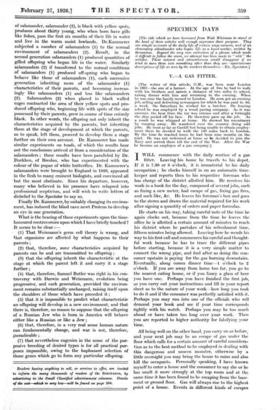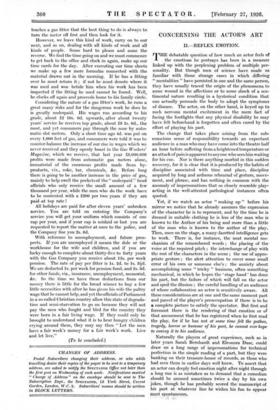SPECIMEN DA YS
[The title which we have .borrowed from Walt Whitman to stand at the head of these articles well enough expresses their purpose. They are simple accounts of the daily life of certain wage-earners, and of an elementary schoolmaster who began life as a hand-worker, written by themselves. Beyond the very rare correction of a phrase which made it difficult to follow the sense, no attempt has been made to " edit " the articles. Their interest and attractiveness would disappear if we tried to turn them into something other than they are--spontancous descriptions of life as seen by the workers themselves.—En. Spectator.] V.—A GAS FITTER.
[The writer of this article, G.M., was born near London in 1891—the son of a farmer. At the age of five be had to walk with his brothers and sisters a distance of two miles to school, taking dinner with him and returning in the evening. When he was nine the family moved to London. He soon got an evening job, selling and delivering newspapers for which he was paid ls. 6d. a week. On Saturdays he worked for a butcher. On leaving school he was employed by a wood paving company. As it was summer, the heat from the tar was intense and after a fortnight the skin peeled off his face. He therefore gave up the job. As a result he was whipped at home. He showed his resentment by running away. He wandered over the country doing odd
jobs. He went as far as Cardiff but being unable to obtain employ- ment there he decided to walk the 140 miles back to London.
By the time he reached home he had been nine months on the road. He was not welcomed at home so he decided to join the Navy and served there till the end of the War. After the War he became an employee of a gas company.] T WILL commence with the daily routine of a gas fitter. Leaving his home he travels to his depot. If it is 7.30 or 8 o'clock, it is immaterial to his daily occupation ; he clocks himself in on an automatic time- keeper and reports then to his respective foreman who has charge of the district allotted him. He receives his work in a book for the day, composed of several jobs, such as fixing a new meter, bad escape of gas, fixing gas fires, and such like, &c. He leaves his foreman's box and goes to the stores and draws the material required for his work after signing a quantity of orders and paper formulas.
He starts on his way, taking careful note of the time he again clocks out, because from the time he leaves the office he is allotted a certain amount of minutes to reach his district where he partakes of his refreshment time, fifteen minutes being allowed. Leaving here he wends his way to his first call and commences his careful and thought. ful work because he has to trace the different pipes before starting, because it is a very simple matter to connect the wrong pipe, and find after so doing the con- sumer upstairs is paying for the gas burning downstairs. Eventually, along comes dinner time-1 o'clock to 2 o'clock. If you are away from home too far, you go to the nearest eating house, or.if you fancy a glass of beer you have one. Perhaps you have finished the first job, so you carry out your instructions and fill in your report sheet as to the nature of your work—how long you took to do it and if the consumer was perfectly satisfied with it. Perhaps you may run into one of the officials who will demand your book and see if your time corresponds rightly with his watch. Perhaps you may be too much ahead or have taken too long over your work. Then you are reported to higher authority for falsifying your time.
All being well on tlie•other hand, you carry on as before, and your next job may be an escape of gas under the floor which calls for a certain amount of careful considera- tion as to the best method to-be employed in dealing with this dangerous and unseen monster, otherwise by a little oversight you may bring the house to ruins and also kill the occupants. Personally • speaking, I have known myself to enter a house and the consumer to say she or he has -smelt it more strongly at the top room and at the same time it has been found to be escaping from the base- ment or ground floor. Gas will always rise to the highest point of a house. E.vents in different kinds of escapes teaches a gas fitter that the best thing to do is always to turn the meter off first and then look for it.
However, we leave this kind of work, carry on to our ' next, and so on, dealing with' all kinds of work and all kinds of people. Some hard to please and some the reverse. We find the time going on and we must commence to get back to the office and clock 'in again, make up our time cards for the day. After executing our time sheets we make up a few more formulas connected with the material drawn out in the morning. If he has a fitting over he must return it ; if not he must denote where it was used and woe betide him when his work has been inspected if the fitting he used cannot be found. Well, he clocks off again and proceeds home to his family circle.
Considering the nature of a gas fitter's work, he runs a great many risks and for the dangerous work he does he is greatly underpaid. His wages run according to his grade, about £2 10s. Od. upwards, after about twenty years' service he receives top grade, about £3 2s. Od., the most, and yet consumers pay through the nose by auto- matic slot meters. Only a short time ago 4d. was put on every 1,000 feet of gas, and consumers were told it was to counter-balance the increase of our rise in wages which we never received and they openly boast in the Gas Workers' Magazine, which we receive, that last year £6,000,000 profits were made from automatic gas meters alone, immaterial of the enormous profits made from by- products, viz., coke, tar, chemicals, &c. Before long there is going to be another increase in the price of gas, mainly to help swell the pockets of the" underpaid" head officials who only receive the small amount of a few thousand per year, while the men who do the work have to be contented with a £200 per two years if they are paid at top rate !
- All holidays are paid for after eleven years' unbroken service. You are told on entering the Company's service you will get your uniform which consists of one cap per year, and if your cap is mislaid or lost you are requested to report the matter at once to the police, and the Company fine you 2s. 6d.
With reference to unemployment, and future pros- pects. If you are unemployed it means the dole or the workhouse for the wife and children, and if you are lucky enough to complete about thirty-five to forty years with the Gas Company you receive about 15s. per week pension. The rate of pay per fitter is ls. 2d. to 1s. 3d. We are deducted ls. per week for pension fund, and 2s. 3d. for other funds, viz., insurance, unemployment, memorial, &c. So the time we have these deductions from our money there is little for the bread winner to buy a -few little necessities with after he has given his wife the paltry wage that he cannot help, and yet the officials of Parliament in a so-called Christian country allow this state of degrada- tion and semi-starvation to go on because they will not pay the men who fought and bled for the country they were born in a fair living wage. If they could only be brought to understand what it is to hear hungry-children crying around them, they may say then " Let the men have a fair week's money for a fair week's work. Live and let live."
(To be concluded.) •























































 Previous page
Previous page